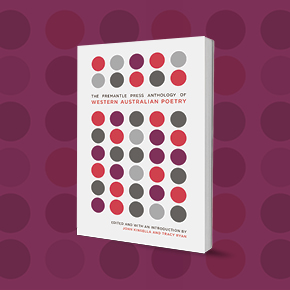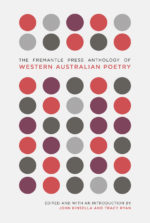An extract from The Fremantle Press Anthology of Western Australian Poetry

We asked editors Tracy Ryan and John Kinsella to pick us a poem each from The Fremantle Press Anthology of Western Australian Poetry. Here’s what they chose.
John Kinsella’s pick was Fay Zwicky’s ‘Kaddish’
“There are, unsurprisingly, so many poems in this collection I could choose as a ‘favourite’. Not really being a ‘winner takes all’ kind of guy, it’s almost impossible for me to establish any kind of preferential list. I have poets I respect or feel a deep connection with, others I am dazzled by, and there are others whose work I simply cannot live without. But given I’ve been asked to select a poem for the occasion, I am going to go for Fay Zwicky’s ‘Kaddish’. When this poem was first published in 1982, it changed the way I thought about not only ‘Western Australian’ or ‘Australian’ poetry, but poetry in general. I was familiar, of course, with its great precursor, Allen Ginsberg’s ‘Kaddish’, a poem whose intense fusion of elegy, critique of its time, and visionary qualities, transformed poetics for a generation. The Mourner’s Kaddish’s praising of God whilst mourning the departed resonates through not only Jewish (funeral) services and tradition, but also through contemporary English-language poetry via Ginsberg’s poem. The response of the ‘congregation’, the response of the individual, the response of a poetry-reading community are interfused. Ginsberg’s loss of his mother is overwhelmed by a tension over the poet’s relationship to the faith of his family, community, and upbringing. But though obviously influenced by it, and written in its penumbra, Zwicky’s poem is unique. Ginsberg’s poem is written in memory of his mother; Zwicky’s for her father. Ginsberg’s address is to what we now call the ‘Beat generation’ echoing out to a Whitmanesque America under assault from the post-war politics of the right, while Zwicky’s is addressed to a post-Romantic Australia whose legacies of the Second World War still resound in the Melbourne of her childhood (recollected in Western Australia), where the rituals of family and the culture of faith bind to a history that fragments, but also remains strong and present. Also Whitmanesque (maybe with some subtexts of Kenneth Slessor’s elegy ‘Five Bells’), her poem was a resounding departure from Australian poetry and it certainly changed me as a poet, and no doubt others. The melding of the quotidian with the ritualistic, the nursery rhyme with the prophetic, the elegy with the language of childhood, the questioning of ‘eternity’ — the registers compile and interweave and create a poem that is steady yet vibrant, totally controlled but full of leaps and jumps into the many layers that make identity, that make community, that constitute memory, that inform the daughter. Such a different background and context from those of Ginsberg’s relationship with his mother, Naomi, and one in which the legacies of Judaism are different (Zwicky’s being a lament for her father), but one in which questions of relationships with family and ‘identity’ are unspooled. A masterpiece.” John Kinsella

Tracy Ryan’s pick was Merv Lilley’s ‘Swift’
“Reading through Merv Lilley’s work in preparing the anthology was a revelation to me. Of course I knew he was a poet, and I knew some of his work, but now I realised that the bright light of his wife Dorothy Hewett’s poetry had meant, for me at least, less recognition of Merv’s own talent. We chose two pieces by Merv for this anthology: one a short but powerful poem from his book Cautious Birds, the other, entitled ‘Swift’, made up of three extracts from a longer work. These are among my favourites in the anthology. ‘Swift’ was written late in Merv’s life and his daughter Rozanna Lilley has said she can’t entirely tell if it is about Merv’s mother or about Dorothy – perhaps there are elements of both – it’s a pretty universal affirmation of loss and persistent connection. I love the excerpts published here for their apparent naturalness that is carefully crafted. The images especially draw on light and sound, so that the commemoration of the dead is embodied and vivid, what you see and hear. As elegy they speak for so many; they contain both sadness and beauty, and find correlation in nature’s patterns of regeneration: ‘the wildflowers springing seasonally all over again following drought and rain’.” Tracy Ryan



